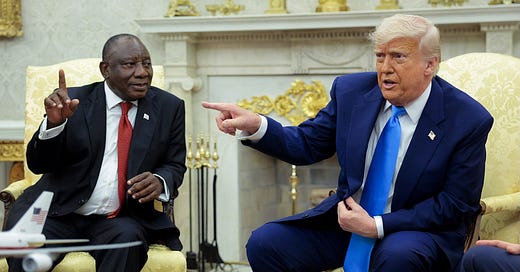The audio above is an AI-generated 'podcast' crafted with careful prompting and highly selected data sources, which you can view here.“All the world’s a stage,
And all the men and women merely players;
They have their exits and their entrances;
And one man in his time plays many parts,
His acts being seven ages.”
— from As You Like It, by William Shakespeare
The audience is distracted by the flashy setting, the melodramatic dialogue on cable news, the talking head commentators. Meanwhile, the real performance — the one that determines who eats and who starves, who thrives and who merely survives — happens behind the curtain.
The age of Mis- Dis- and Malinformation we’re living in requires an appropriate lens through which to interpret any event that captures the world’s attention. The Trump-Ramaphosa meeting on May 21, 2025 most definitely captured attention, but farm murders is not the right lens.
Questions worth asking:
Why are world leaders visiting the White House? Why did Trump visit Saudi Arabia, Qatar, and the UAE from May 13 to 16, 2025? Why did Trump hold a two-hour phone call with Russian leader Vladimir Putin on May 19, 2025?
To construct an appropriate lens through which to view and answer these questions, let’s review modern monetary resets using Shakespeare’s seven act structure. Why? Because what’s going on is the Trump administration getting their ducks in a row for the next monetary reset. Tariffs are a convenient way of getting everyone round the negotiating table.
Let’s dive in.
Monetary Resets: A Play in Seven Acts
First Act: The Gold Standard (1870s–1914)
At first, the innocent gold standard, shining and trusted, linking paper to something you could hold. We abandoned that play not because it failed but because it worked too well — it prevented powerful players from creating money out of thin air.
Second Act: Bretton Woods (1944–1971)
Then came Bretton Woods, the schoolboy arrangement where nations agreed to fixed exchange rates, with the dollar as the golden child. It taught us to trust the system while the system itself was learning how to break its own rules.
Third Act: Nixon’s Gambit (1971)
And then, the lover, sighing like a furnace, with woeful ballads sung to gold’s departed discipline. 1971: Nixon closed the gold window and opened Pandora’s box. The media covered it for a day. The implications continue five decades later.
Fourth Act: Petrodollar Dominance (1973)
Then a soldier, full of strange oaths, jealous in honor, seeking the bubble reputation even in the cannon’s mouth. The petrodollar system emerges — military might guaranteeing monetary supremacy.
Fifth Act: The Financialization (2007–)
And then the banker, in fair round belly, creating derivatives of derivatives, slicing risk until it disappears from view but not from reality. 2008 shows us the cost of this self-deception.
Sixth Act: Quantitative Easing (2009–)
The sixth age shifts into the lean and slippered central banker, with spectacles on nose and formality in voice, printing trillions because the alternative appears worse. The audience applauds higher stock prices while their purchasing power leaks away.
Seventh Act: The Coming Reset (pre-2030)
Last scene of all, that ends this strange eventful history, is the reset we’re hurtling toward — a second childishness of monetary systems, where we pretend we’ve found the answer when we’re simply starting the cycle again.
But here’s what you won’t hear during intermission:
The real drama isn’t a political tiff, inflation numbers, interest rates, or even stock prices. It’s who gets to write the next play. Who designs the new monetary system when this one finally admits exhaustion?
Will it be the Mar-a-Lago Accord? A BRICS arrangement? A supranational digital currency? Or something we haven’t imagined?
The mainstream media sells tickets to a costume drama while the actual battle — the one for financial domination — happens in dimly lit rooms where you and I will never be invited.
But this is where the Evolutionary Agent’s role begins.
You see, being a spectator is a choice. Most choose to watch the prescribed drama, to follow along with commentators telling them what to think about meaningless plot points.
The alternative?
Recognize that you’re not just audience. You’re potentially a player. Maybe not center stage, but certainly not relegated to merely watching.
What if you understood that monetary systems aren’t natural phenomena but human creations? What if you saw clearly that their design determines who prospers and who struggles?
The questions worth asking aren’t about which politician said what outrageous thing in front of the cameras. The question is: who benefits from this distraction while the script for the next global financial system is being written?
The curtain is rising on the next monetary act. It will play out before 2030, at least according to public statements made by WEF and IMF. Most will review the performance after it’s over. Some will recognize that right now — this moment — is when the casting calls are happening.
Which role will you play?
References
Mis- Dis- and Malinformation: The three categories of information manipulation that are relevant to the Department of Homeland Security’s (DHS) counterterrorism and public safety initiatives. Deep dive
Modern Monetary Resets: Deep dive
Classical Gold Standard (1870s–1914)
Interwar Experiment (1925–1931)
Bretton Woods (1944–1971)
Smithsonian Agreement (1971–1973)
Plaza Accord (1985)
Euro (1999–Present)
CBDCs (Emerging)
Mar-a-Lago Accord (Emerging) Deep dive
BRICS Reserve Currency: On June 22, 2022, Vladimir Putin announced to participants of the BRICS business forum the creation of an international reserve currency based on a basket of currencies of the BRICS countries. The BRICS reserve currency is meant to rival the US dollar and the IMF’s Special Drawing Rights (SDRs) currency. Deep dive
New Bretton Woods: On October 15, 2020, the IMF announced A New Bretton Woods Moment, signaling their intent to establish a new global monetary consensus centered on digital sovereign currencies. Deep dive













Share this post